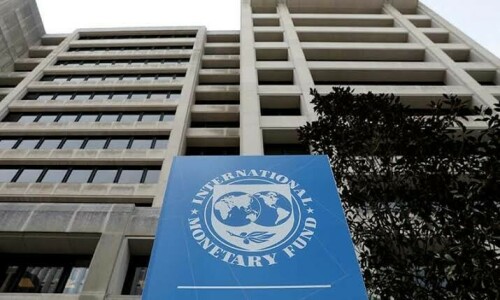KARACHI: Speakers at a session observed that the Karoonjhar mountains and the Indus River belong to the local people, particularly indigenous communities, and these natural resources should not be exploited for capitalist ventures that provide no benefits to them.
Activists, lawyers and community members gathered at Frere Hall on Sunday not only to speak out against ‘injustices’, but also to educate people about the “reality of the situation”.
The discussion was moderated by social activist Sheema Kermani. The session was organised by Aurat March.
“Sindh has always belonged to its common people, who have spent their lives in the province, giving their blood and sweat. However, it is unfortunate that the privileged larger communities have oppressed the smaller, underprivileged ones. This reflects the unequal distribution of resources,” Hoorunissa Palijo, one of the faces of Sindhiani Tehreek, a women-led political organisation in the rural part of Sindh, said.
“Their plan is to seize the sea, which rightfully belongs to the people, and once they succeed, we will be left with nothing,” she concluded, with a few verses by poet Shah Abdul Latif Bhittai, which emphasised on following the path of truth.
Abira Altaf, lawyer, shed light on the history of the Indus River and explained how the British rulers did not interfere with Sindh due to treaties. However, people always knew that efforts to capture the river — a vital natural resource for the common people — would eventually arise.
“The design of the Left Bank Outfall Drain (LBOD) was created without the involvement of indigenous communities, leading to disastrous consequences. During the 2022 floods, it broke again and has yet to be reconstructed. This highlights that we cannot build resources for common people without considering their input,” she said.
When she began discussing Sindh’s energy basket and its natural resources of oil and natural gas, Mazhar, a resident of Ghotki, pointed out the irony: “although gas is extracted from my village, the village itself does not have access to it”.
She also discussed the mining in Kirthar National Park, which began in the late 2010s. Indigenous farmers filed a case against it and obtained a stay order; however, the temporary bans did little to aid preservation. She then spoke about granite mining in Karoonjhar, a purely capitalistic venture that was later banned because Karoonjhar is a heritage site, and heritage cannot be exploited for capitalist ventures.
“There is no room for pessimism when it is about activism,” she concluded.
Younus Khaskheli, representative of the indigenous fishing community then joined the conversation, agreeing with everything said earlier. He went on to explain how recent capitalist measures have been affecting indigenous communities.
“The fishing community has worked tirelessly for the betterment of both their community and the country,” he said.
“Right now, in the sea, only 1.6 per cent of indigenous fishermen make their living; the rest? It belongs to companies. The companies have been encroaching on the rights of common fishermen, who are barely making ends meet,” he said.
He then explained how the Delta has already been cleared, and now Zone 1, which extends from Clifton to Seaview, also doesn’t have much to offer due to company trolling.
The conversation then delved further into how Sindh and its resources need saving, emphasising that it would be the common people who will protect these resources for their benefit, not for the ‘big fish’ of the corporate world.
Published in Dawn, December 10th, 2024












































